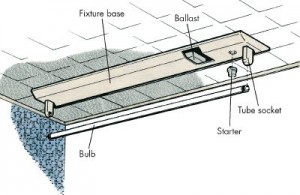
Poorly engineered fluorescent ballasts are often culprits of broad spectrum radio interference. (Image: HowStuffWorks.com)
I’m happy to see RFI being mentioned in the Wall Street Journal.
Many thanks to SWLing Post reader, Ulis, for the tip:
(Source: Wall Street Journal)
A federal agent who shows up unannounced at a building along a Texas highway might be looking for any number of things: illicit drugs or immigration violations, say, or illegal firearms.
Or fluorescent lights.
Which was what the agent had in mind who walked into the Perfect Cuts salon in San Antonio last July. The lights were violating communications regulations.
The agent had used signal-tracking equipment to home in on the offenders and told the owner, Ronald Bethany, that his lights emitted radio signals that interfered with an AT&T cellphone tower.
[…]The mixed signals aren’t always so weighty. In recent years, the FCC has issued warning letters directing people to stop operating cordless phones, television sets and wireless cameras.
[…]The FCC can demand fines up to $16,000 a day or $112,500 an incident from people who aren’t FCC licensees. Offenders usually rectify problems, the FCC says, often working them out with whomever is complaining.
Managing the radio spectrum “has been part of our core mission since the inception of the FCC in 1934,” says Julius Knapp, head of the agency’s Office of Engineering and Technology.
[…]The government doesn’t much care why interference happens. To the FCC, noise is noise.
In a 2013 letter, the FCC wrote to the owner of a plasma TV set after a ham-radio operator complained to the agency of interference. “Continued operation of the television,” warned the letter, from which the TV owner’s identification is redacted, “is not legal under FCC rules.”
[…]Ham-radio operators are a frequent source of complaints. A 2012 FCC letter told a Pomona Park, Fla., resident to stop using a well pump that conflicted with amateur-radio frequencies.
[…]Radio hobbyist Tom Thompson of Boulder, Colo., last year tracked a signal using a homemade contraption. After knocking on the suspect’s door, he traced it to ballasts on marijuana grow-room lights. He says he built a filter that the grower agreed to use.
Ballasts are frequent offenders. Makers of the components, which regulate electricity to bulbs, test them for FCC compliance. Some interfere anyway.[…]

Unless you use the HF part of the radio spectrum for hobby or business most people are completely unaware of the problems they are causing others. Loading up a home with all the latest tech gives access to entertainment but can easily be taking it away from one of your neighbors.
After years of living in a city I have moved out into the countryside and was amazed at the drop in overall interference and thinking back I remember how my listening activities had been “adjusted” to cope with the level of noise I was experiencing before the move.
Do you think most radio users put up with interference because they think getting to to root of the problem is going to be impossible?
> After years of living in a city I have moved out
> into the countryside and was amazed at the drop
> in overall interference
I experience the same all over again at my SW mobile station: Driving out into the countryside lets drop the background noise considerably.
Agreed, it can seriously make a difference to the amount received when the noise floor is reduced by a few S points.
Me and the wife are still young enough (just) to drag ourselves up mountains for some wild camping in the summer and I never fail to take a portable SW radio and a good length of (light) wire along.
I’ve been dealing with radio interference on a daily basis since I moved to central Texas. I’ve tried complaining to the FCC, but they say the problem is with my radios. I’ve had one radio for over 15 years and the other for 25, and never had a problem until now. I also experience intermittent reception problems with my car radio on my 10 mile trip to work
Whether the problem is with transmitters or receivers, why do they allow the sale, let alone the import, of these defective products? Why do they treat the innocent consumers like violators, rather than the manufacturers and retailers? What a screwy country we’ve become.
Here in Germany things are a bit different. If you complain to our “BNetzA” (don’r expect me to translate this acronym) about RFI to broadcast stations, chances are good that they make measurements on site. Chances are less if you complain about bad ham radio reception.
In all cases give them detailed descriptions of the RFI, especially times when you suffer it regularily so they can measure it.
Messed-up receivers are quite common these days. There is always someone who can produce anything even cheaper. Customs have no chance to check everything.
This is true. If the tube is interfering with a cell tower they will be around like a shot. But if a CFL bulb is interference with your neighbour’s reception of Voice of Russia, good luck with persuading anyone to care.
In our modern word in general, and with Chinese Exported electronics in particular, electronic compatibility is a big problem. In this respect most plasma TVs and powerline products are broken by design. Fluorescent or LED lights are frequent sources of interference because the manufacturer tried to ensure another half cent of profits.
A perhaps mostly European problem is that frequencies below 30 MHz are hardly used anymore. Hardly any German stations can still be heard on shortwave and in 2015 the last AM transmission stations will be closed down over here. Then very few people will see a point in protecting these resources.